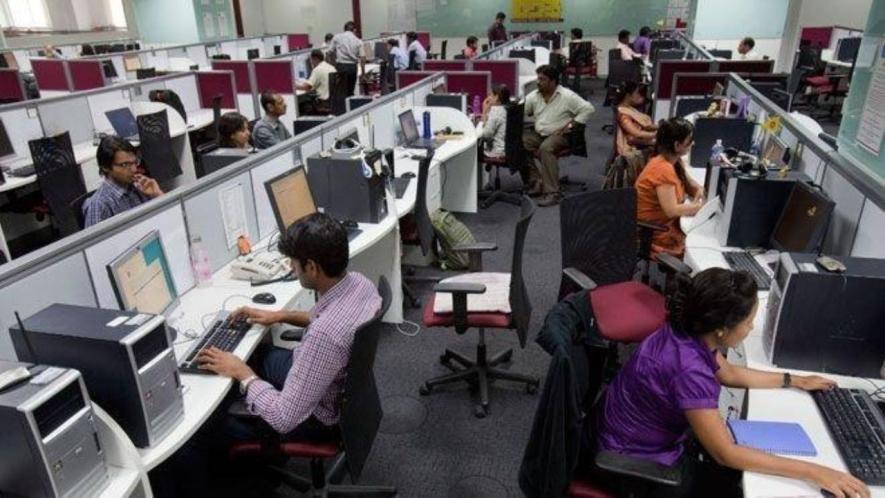Whose Interests is India's Tech Workforce Serving?

File Image
It would be rather obvious to say that we live in a world controlled by market forces. We study, so that we can earn. We earn, so that we can own. We own, so that we can invest, so that we can own more, so that…you get the idea.
In this world, labour, like every other commodity that exchanges hands, is expected to yield a certain return to the boss man. But while the market value of other commodities – like gold or petrol – is dictated by scarcity, labour’s market value comes from its abundance. The spectre of unemployment, which is treated as a social, religious, cultural, economic, and political malady, forever looms as a haunting threat above the workers’ heads, forcing them to keep competing with each other.
For most of India’s tech workers, this hyper-competitive environment means exploitative work conditions, precarious living arrangements, and a hierarchical structure that rewards obedience and subservience. But it is also true that this workforce is not a uniform entity. In fact, a certain segment of this group – including the alumni of India’s elite STEM (science, technology, engineering, mathematics) colleges – finds itself in well-paying and relatively more secure jobs.
By thus showering this small group of workers with monetary benefits and perks, the market creates a feedback loop that keeps the majority in check. They are encouraged, incentivised, and, in many cases, threatened, to follow in the steps of their better-paid peers, forced to keep running in the rat race. More importantly, even the supposed winners of this race are not truly free.
For starters, the market alienates these highly-educated and clearly skilled individuals from their own interests, forcing them to work on products and ideas that benefit no one but the valuation of their employers, even if they harm the larger public. What is even worse is that despite sustaining a multi-trillion dollar global economy, this group hardly sees itself as belonging to a larger workforce, let alone a united one.
As a result, far from resisting the market’s demands, these well-off workers become aspiring entrepreneurs – capitalists in making, if you will. From data-hungry apps all the way to pointless, and even harmful, AI (artificial intelligence) tools, they are trained to use their knowledge to do nothing but create whatever is deemed worthy of a reward. Their questions and concerns about the social utility of their labour (if there are any in the first place) are necessarily side-stepped for more relevant factors, such as monetization or investor interest.
Now, is this specific to India? Certainly not. The recent capture of the US state by the Big Tech and ‘crypto’ lobbies, is a clear indication of whose requirements tech workers are really addressing.
Is this limited to tech workers alone? Also, a no. Engineers, scientists, and developers of today are just the latest addition to hordes of workers serving the interests of the ruling classes.
Why Write This? And Why Now?
To begin with, India’s submission to market forces has been dizzyingly quick in the digital economy. Its embrace of certain technologies for governance purposes (like DPIs – digital public infrastructure) and its large-scale support for digitally-enabled startups (through Digital India, Startup India, the IndiaAI Mission, among others) are just the more visible examples of this capitulation. Combine that with our legacy of providing cheap labour to MNCs (multinational corporations) – and, for the past 30 years or so, Indian tech workers have uncritically served the interests of global and domestic capital.
Locally, this has meant an ever-growing interest in engineering courses, especially in computer science and electronics, which has only amplified the competitive pressures on an already exploited workforce. Domestic MNCs, such as Infosys, WIPRO, and TCS, are clear examples of how these ‘high-skilled’ workers are seen as easily replaceable by market giants (1, 2, 3, 4, 5, 6, 7). And these are just the home-grown capitalists – let us not even get into on Big Tech and how it has completely dismembered any semblance of worker opposition.
The overtly exploited and alienated nature of these workers is only one reason behind focusing on them here. The other reason is that the technologies they develop, which are becoming more and more ubiquitous in our lives, re-create the market’s logic of segmentation, exploitation, and alienation in sectors where it did not exist! Urban Company and its top-down standardisation of beauty workers is a great example of this trend.
Everything from healthcare, education, and banking, to personal communication, media and entertainment is now mediated by a set of extractive digital platforms designed to maximise user engagement and sustain the ad economy that runs today’s internet. While data breaches, financial frauds, and online misinformation are the more noticeable adverse outcomes of such innovations, there is a much darker side of things, too.
Because of the warm relationship that the capitalist class wishes to enjoy with any State, the labour of this workforce also serves the interests of authoritarian governments across the world. This can be best seen in the creation of large-scale surveillance technologies, including Pegasus, which has reportedly been used on Indian civil rights activists.
So, here we are. Subject to the market’s logic of production, the Indian tech workforce presents a bit of an interesting contradiction. Its internal inequality means that most tech workers are too busy surviving and climbing the hierarchy to even question the outcomes of their labour, whereas those with more security are too disillusioned with the capitalist promise of success to even care.
Before this bleak outlook puts you off, one must state that this is not inevitable.
As a start, workers involved in sustaining the digital economy, especially those in relatively secure places, can introspect on the social, economic, and political ramifications of their work. Think of it as a more voluntary analogue to the Hippocratic Oath, but for coders, developers, and designers. Something that ensures that your labour does not power innovations that are harmful (such as deceptive design practices), and certainly not those that are just outright deadly (like, killer drones, maybe?).
But it is also important to recognise that a change in individual attitudes alone would not suffice here. It does not matter if a few workers create more ethical digital technologies -- competitive pressures ensure that a small band of such rebels will either be fired and replaced, or if they succeed, they will have to compete in an uphill battle with firms that may not be as interested in paying such ‘ethical costs’ (for the lack of a better word).
Unless such costs are imposed consistently – through regulatory interventions or other external pressures – companies will always have an incentive to shirk these responsibilities in a hyper-competitive environment. As a prominent example, look at how the world’s biggest tech giants quietly went back on their sustainability goals when they realised that serving the AI demand would require them to double down on energy and water consumption!
This gap brings us to the second point.
Educate. Agitate. Organise
As engineers, scientists, and people with technical expertise, this class of workers is not alien to the power of knowledge. And if there is one good thing about the modern internet, it is its sustained (albeit, struggling) democratisation of information.
So, step away from algorithmically enclosed social networks that feed you information passively. Instead, learn about the political value of your work and your labour by seeking answers more actively – be it through books, newsletters, documentaries, audio books, blogs, or just even talking to people around you. Most importantly, learn about the lives not just made because of your innovations, but also those that were disrupted or, worse, destroyed. (A few personal suggestions on books that can help you get started: 1, 2, 3, 4).
You may not feel comfortable seeking this knowledge, and you may not be able to do much with it yet. But this is just the first step.
If all goes well, this experience should ideally force some of you (yes, I’m talking to the IITians and the BITSians here) to confront the realities of your labour. Start with your colleagues. Talk to them about what you are learning and seek out their perspectives on it. Invite them to help you care for this sapling of radical education. You should also feel the urge to question your superiors – in your workplaces, in your colleges, in your ministries. Indulge in this emotion. Nurture it.
And that is not just because asking questions makes you more informed, but also because the act of questioning authority in a public setting normalises that urge in your peers. They may begin to dwell on these issues, too, and who knows, your actions may even earn you an ally. “Sure,” I see you wondering, “but what about the ramifications of raising these questions? What if I am fired, or rusticated, or just alienated?” Fair, and that brings me to ‘Organise.’
You are not the first worker to be facing this conflict. The history of capitalism is filled with examples after examples of workers unionising to fight the employers’ urge to skirt criticism or amplify exploitation. Learn from that history. Global examples like the “Boycott, Divestment, and Sanctions” (BDS) movement also provide a recent glimpse of how powerful worker mobilisation and collective action can be (1, 2, 3, 4, 5). Despite their relative nascence, IT/ITes workers’ unions in India are gaining rapid momentum and popularity. Reach out to these organisations, and others like them, and become aware of your rights as an employee, as an independent contractor, or even as an unpaid intern.
Find unity in numbers. And believe it or not, this would definitely require you to repair the rifts caused by systems of religious, caste, and gender oppression inside your workforce. The ruling class is an expert at widening differences between you and your peers to challenge your efforts in all ways possible. So, unless you begin seeing them as equal and dignified fellows, you will be alienated from each other and picked apart by the powers that be.
Last, if you find yourself too introverted or too exhausted to do any of this, consider using your leisure time to volunteer your labour for more equitable solutions.
Use your knowledge and skills to imagine technical alternatives to today’s social media, e-commerce, and search monopolies. India’s foray into DPIs, for all its faults, provides a partial glimpse into what large-scale digital innovations created on the lines of interoperability, openness, and collective ownership could look like. Use these experiences as a springboard to contribute to open-source projects. And if you can, support organisations and institutes that lack the requisite technical capacity to oppose the ongoing onslaught of capital.
The tech workers of this country have remained pawns in the game of wealth transfer for too long now. Initially the affordable back-office of multinational conglomerates, India has since transitioned into an ally to global capitalism. But the tech workforce of this country remains split. Some are lured by the idea of making it big, and fail to realise the implications of their labour on communities out of their sight. And a majority of others – those without access to caste networks and private capital – are made to slog as chattel for mere pittances in a work culture that sucks the life out of you.
This needs to change. This article tries to articulate the need for the many tech workers of today and of the years to come. Your knowledge and your labour deserve more than what the current system of economic production offers you. Worse still, it is your labour that is also responsible for powering and sustaining that same system today.
As students of STEM, we are all much too aware of the double-sided nature of technological progress, but it is high time we realise that we are no longer just passive participants in this journey. You, as an individual, may not be able to do a lot; but you, as a class of workers, can certainly aspire to that.
It will take time, sure, but the question remains: how comfortable are you supporting a system that not only alienates you from your peers, but also makes you support a wasteful, harmful, and exploitative logic of technological growth?
The author is a technology researcher and writer. The views are personal.
Get the latest reports & analysis with people's perspective on Protests, movements & deep analytical videos, discussions of the current affairs in your Telegram app. Subscribe to NewsClick's Telegram channel & get Real-Time updates on stories, as they get published on our website.























